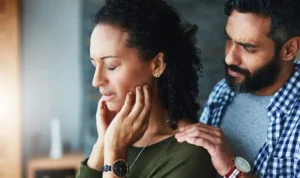Navigating through the world of relationships can often feel like traversing a complex labyrinth, filled with beautiful moments of intimacy and connection but also challenges and misunderstandings. Now, imagine attempting to do so while carrying the burden of unresolved trauma. For many individuals and couples, this is not just a hypothetical scenario but a daily reality.
In this blog, we aim to shine a light on the nature of unresolved trauma, and how it may be influencing your relationship. We will delve into the complexities of unresolved trauma, how it impacts individual well-being, and how it consequently shapes relationship dynamics. So let’s dive in!
Contents
Understanding the Nature of Unresolved Trauma
 Unresolved trauma is trauma that a person has not yet fully processed or healed from. It’s like an open wound in the psyche, continually causing pain and affecting various aspects of the person’s life. Trauma comes in many forms, such as physical, emotional, or sexual abuse, loss of a loved one, exposure to violence, or experiencing a natural disaster or war. While the event itself is traumatic, it is the person’s inability to emotionally process and recover from the event that leads to unresolved trauma.
Unresolved trauma is trauma that a person has not yet fully processed or healed from. It’s like an open wound in the psyche, continually causing pain and affecting various aspects of the person’s life. Trauma comes in many forms, such as physical, emotional, or sexual abuse, loss of a loved one, exposure to violence, or experiencing a natural disaster or war. While the event itself is traumatic, it is the person’s inability to emotionally process and recover from the event that leads to unresolved trauma.
Unresolved trauma can lead to a lot of emotional pain. People may feel on edge all the time, have nightmares or flashbacks about the trauma, or even feel numb or disconnected from others. It’s like the ‘fight, flight, or freeze’ alarm is always on, even when there’s no actual danger.
The important thing to remember is that unresolved trauma is not the fault of the person experiencing it. It’s simply a sign that they went through something very tough and haven’t had the chance or resources to fully heal yet. And with the right help and support, it is possible to resolve trauma and move forward.
Can Unresolved Trauma Impact On Your Relationship?
 Absolutely, unresolved trauma can significantly impact relationships in various ways. Let’s break it down using simple examples.
Absolutely, unresolved trauma can significantly impact relationships in various ways. Let’s break it down using simple examples.
- Intrusion of the past: Unresolved trauma often brings the past into the present. This means that feelings and fears related to past traumatic experiences can surface in your current relationship. For example, if someone has had a traumatic experience involving trust, they might find it hard to trust their partner fully, even if there’s no reason to doubt them.
- Emotional availability: Trauma can also affect how emotionally available a person is in a relationship. They might feel numb or disconnected, making it difficult to share or receive love, comfort, and affection. This can make their partner feel rejected or ignored, leading to misunderstandings and friction.
- Communication problems: Unresolved trauma can make open and honest communication a challenge. Trauma survivors might find it hard to express their thoughts and feelings, fearing they might be misunderstood, judged, or hurt. This lack of communication can create a gap between partners.
- Intimacy issues: Trauma, particularly when related to abuse, can create complications around physical intimacy. The survivor might feel uncomfortable or anxious, making it difficult to engage in or enjoy intimate moments.
- Overreaction to triggers: Unresolved trauma often involves certain triggers — things that remind the person of their past traumatic experiences. Triggers can lead to strong emotional responses, like sudden anger or fear, which can be confusing or hurtful to a partner who doesn’t understand the cause.
- Fear of abandonment: If someone has experienced loss or abandonment in the past, they might live in constant fear that their partner will leave them. This can make them overly clingy or overly distant, both of which can strain a relationship.
Can Past Trauma Ruin a Relationship?

Past trauma can certainly create challenges in a relationship, but it doesn’t necessarily have to ruin it. The impact of trauma on a relationship largely depends on how it’s handled by both partners. Here’s how trauma might present difficulties:
- Emotional Unavailability: If one partner is dealing with unresolved trauma, they may have difficulty being emotionally present and available in the relationship. This can leave the other person feeling isolated or neglected.
- Cycles of Abuse: People who have experienced trauma, especially in their early years, might become overly controlling or aggressive without realizing that their behavior is a reflection of their past experiences.
- Trust Issues: Past trauma can cause a person to have trust issues, especially if the trauma was related to betrayal or deceit. This might make the traumatized person suspicious or overly protective, which can strain the relationship.
- Fear of Intimacy: Past trauma can lead to fear of intimacy, which might manifest as pushing the partner away or sabotaging the relationship when it becomes too close or intense. This pattern can create an emotionally volatile and unsatisfying relationship.
- Miscommunication: Trauma survivors often find it hard to communicate about their feelings or their past, which can lead to misunderstandings or feelings of distance between partners.
- Overreaction to Triggers: Things that remind a person of their traumatic experience — known as triggers — can cause them to react strongly. This might manifest as sudden anger, sadness, or withdrawal, which can be confusing or hurtful for their partner.
- Extreme Reactions: Trauma survivors might have extreme reactions to triggers, leading to arguments and emotional volatility. They might become overly sensitive to perceived slights or criticisms, leading to frequent conflicts and misunderstandings.
How Can I Stop This Trauma from Ruining My Relationship?
 If you’re concerned that past trauma is affecting your relationship, it’s important to know that there are steps you can take to address this. Here are some strategies that might help:
If you’re concerned that past trauma is affecting your relationship, it’s important to know that there are steps you can take to address this. Here are some strategies that might help:
- Acknowledge the Impact: The first step is to recognize and accept that your trauma is affecting your relationship. It’s not about blame, but rather understanding how your past experiences are shaping your present behavior and emotions.
- Open Communication: Talk to your partner about your experiences, as much as you feel comfortable. They might not fully understand what you’re going through, but they can provide emotional support to navigate any challenges that come up in your relationship.
- Seek Professional Help: A mental health professional, like a therapist or counselor, can provide valuable tools and techniques for dealing with trauma. They can help you process your past experiences and develop healthy coping strategies. If it feels appropriate, you might consider couples therapy, where both you and your partner can learn how to support each other.
- Self-Care: Make sure to take care of your physical, mental, and emotional health. Regular exercise, a healthy diet, enough sleep, and relaxation techniques such as meditation or yoga can help reduce stress and improve your overall well-being.
- Learn About Trauma: Understanding trauma and its effects can make it less frightening. There are many resources available online, and books on the subject can provide valuable insights.
- Establish Boundaries: Ensure you have clear boundaries in your relationship, and communicate them to your partner. It’s okay to need space sometimes or to let your partner know when certain behaviors or situations make you uncomfortable.
- Practice Patience: Healing from trauma takes time, and there may be ups and downs along the way. Be patient with yourself and with your partner, and remember that it’s okay to have difficult days.
How Therapy Can Help Solve and Heal Unresolved Trauma
 Therapy plays a crucial role in helping individuals unravel and heal from unresolved trauma. It provides a safe, supportive environment where people can explore their traumatic experiences and learn effective coping strategies. Here’s how therapy can help:
Therapy plays a crucial role in helping individuals unravel and heal from unresolved trauma. It provides a safe, supportive environment where people can explore their traumatic experiences and learn effective coping strategies. Here’s how therapy can help:
- Understanding the Trauma: A therapist can help you understand the nature of your trauma, how it has impacted your life, and why certain triggers lead to particular responses. This understanding is a key first step in the healing process.
- Processing Traumatic Memories: Therapy provides a space where you can talk about your trauma in a controlled, supportive environment. This can help you process traumatic memories and emotions, and eventually reduce their intensity.
- Learning Coping Strategies: Therapists can teach you effective techniques to manage symptoms of trauma, like anxiety, anger, or flashbacks. This can include strategies like mindfulness, relaxation techniques, and cognitive-behavioral strategies.
- Improving Emotional Regulation: Therapy can help you learn how to better regulate your emotions. This can mean understanding your emotional triggers, finding healthy ways to express your feelings, and developing strategies to calm yourself when you’re upset.
- Rebuilding Self-Esteem: Trauma can deeply impact your self-esteem and self-worth. A therapist can help you challenge negative self-beliefs and rebuild your confidence.
- Enhancing Relationship Skills: If unresolved trauma is affecting your relationships, therapy can provide strategies to improve communication, establish healthy boundaries, and build trust with others.
- Trauma-Specific Therapies: There are various types of therapy specifically designed for trauma recovery. These include Eye Movement Desensitization and Reprocessing (EMDR), Trauma-Focused Cognitive Behavioral Therapy (TF-CBT), and Prolonged Exposure Therapy. Your therapist can guide you to the approach that’s best suited to your needs.
Conclusion
Unresolved trauma can indeed cast a long shadow, impacting various facets of our lives, especially our relationships. However, it’s crucial to remember that such challenges don’t signify an inevitable end to a relationship or the possibility of forming healthy bonds.
With patience, understanding, and support, healing from unresolved trauma is possible, opening doors to healthier, more fulfilling relationships.
Relationships are complex, and it’s natural for issues to arise along the way. If you have any queries regarding Relationship Counseling experienced therapists at CoupleMantra can help: Book a trial couple therapy session


